War Survivor Focuses Lens on Refugees
Giles Duley walks through the main port on the Greek island of Lesvos, in the Aegean Sea, photographing refugees awaiting a ferry boat to Athens, when a man in a wheelchair motions him over.
He introduces himself as Khalil, from Deir ez-Zor, Syria. Khalil lost a leg this fall when pro-government forces dropped a bomb on his home.
He had arrived on Lesvos from Turkey two days earlier in a flimsy rubber boat, along with his wife and three teenaged children: a daughter and two sons. He asks Duley which European country he thinks could provide him a prosthetic leg.
Then, adds: “How long do you think it will be before I walk again?”
Duley, 44, is used to such questions. The world-renowned humanitarian photographer lost both legs and his left arm in 2011 while photographing American troops in Afghanistan.
He was on patrol with 75th Cavalry Regiment when he stepped on an improvised explosive device (IED).
The blast nearly killed him. He thought he would never take another photo.
But after 37 surgeries and a year in the hospital, including two months in intensive care, Duley was back in the field, determined to continue a personal project he calls Legacy of War. The project is a culmination of the decade he spent documenting the long-term impact of conflict on communities worldwide.
Duley is currently on a three-month assignment with UNHCR, documenting Europe’s refugee crisis as part of his broader project.
“The idea is to look at the long term. What happens to people 10, 20, 30 years after a war is over?” Duley says. “I noticed commonalities in what I was seeing around the world. So I wanted to make a project to bring those themes together across decades and geographies.”
The economic, psychological, environmental and physical scars of war can last for decades, even affecting generations born after the conflict. Duley’s injuries give him particular insight into the stories he tells.
“I live with my own legacy of war every day,” explains Duley, who walks with two prosthetic legs. His gait is stiff and measured. To take photos, he holds his camera in his right hand and balances the lens on the stump of his left arm.
“I live with my own legacy of war every day.”
So far, Duley’s work has been published by many respected media outlets, including Vogue, GQ, Esquire and Rolling Stone, and exhibited in prestigious venues. He won the Prix de Paris in 2010 and again in 2012, and his self-portrait was featured in the Taylor Wessing Exhibition at the National Portrait Gallery.
“Giles introduces us to people hidden by numbers,” says UNHCR Chief Spokesperson Melissa Fleming. “In the blink of an eye, they are illuminated, and revealed.”
Among refugees Duley meets, there’s an instant rapport. In the three weeks I travelled with Duley through Greece this fall (2015), I saw the same scenario at least half a dozen times.
A refugee will approach him, politely inquiring what happened to his body. A small crowd gathers as he briefly explains. Someone offers him a place to sit.
Then, as he finishes, their own stories pour out, a tumble of war and pain and memories left behind, mixed together with dreams of a peaceful future and confusion over how to get through the uncertain present.

A Syrian refugee who lost his left leg during an air raid in Syria tells Giles Duley his story on the Greek island of Lesvos. UNHCR/Achilleas Zavallis
His disabilities offer a rare intimacy between photographer and subject.
“People see right away I’m committed to telling their stories,” Duley explains. “It opens up a lot of trust. I’d like to think I’d always have managed to get there, but this makes it go a lot quicker.”
“People see right away I’m committed to telling their stories.”
Earlier this month at Idomeni, on the Greek side of the border crossing with the Former Yugoslav Republic of Macedonia, Duley joined a group of Pakistanis gathered around a fire. They were suddenly stranded along with thousands of others in mid-November, after Balkan countries restricted some nationalities from crossing.
They complained to him of cold feet.
Duley broke into a smile, then delivered a line from his special brand of self-deprecating, triple-amputee humor: “Sorry, but I don’t have that problem.”

Giles Duley seen in Camp B of the Idomeni transit station. UNHCR/Achilleas Zavallis
Still, photographing refugees’ journeys through Europe is not easy.
On Lesvos, people disembarking from rubber dinghies first step onto jagged, slippery rocks. They are then registered at reception centres built on hillsides, where pebbled walkways turn into muddy streams when it rains. At Idomeni, refugees slept in tents pitched in farm fields or in the gravel alongside train tracks.
Duley treks through it all. But after a few hours, he gets tired. Standing still to take a photo can be painful. He likens each day to running a marathon with camera equipment in tow.
“I always focus on what I can do. I think a lot of creativity comes out of restriction.”
“Most of the time I travel on my own,” Duley explains. “Now imagine you’re in Laos and it’s muddy and raining and you’re carrying all your cameras. And you’re trying to unload a roll of film with one hand. It’s hard, damned hard.”
Sometimes his physical limitations mean he cannot shoot the angles he wants.
“I can’t think about that because it would just destroy me,” he continues. “So I always focus on what I can do. I think a lot of creativity comes out of restriction.”

With fear etched on their faces following their journey by boat across the Aegean, an Afghan family arrives in Lesvos. UNHCR/Giles Duley
“Through Giles’ images, we form relationships,” added Fleming. “We find empathy and connect; we discover the displaced as fellow travellers, confronted with circumstances the use of numbers had allowed us to ignore. We share moments of the most mundane intimacy.”
Duley’s evolution as a photographer began when, as a child growing up in Somerset, England, he dreamed of joining the army. He was fascinated by heroic tales of soldiers returning from battlefields.
“Through Giles’ images, we form relationships.”
It was not until he grew older that he became more interested in war’s effects and consequences, both on soldiers and civilians. At 18, Duley was bedridden for five months after being involved in a car accident. His late godfather’s wife brought him two items: his godfather’s old Olympus OM-10 camera, and the autobiography of war photographer Don McCullin.
Duley taught himself photography from his bed. He developed films in a darkroom he built in the bathroom of his parents’ house.
What followed was a decade of stardom as a fashion and music photographer. Duley covered rock-n-roll icons like Oasis, Marilyn Manson and Lenny Kravitz. His photo spreads appeared in GQ, Esquire and Vogue.

Before focusing on humanitarian causes, Giles Duley covered rock-n-roll icons like Lenny Kravitz. Giles Duley
But by his late 20s, Duley sank into a deep depression. His work, he says, was shallow and manipulative. One day – he can’t quite recall why – he smashed up his cameras and burned all his negatives. He sold his London flat and moved to Hastings, on England’s southern coast, to work as a bartender.
There, he met a family with a severely autistic son, Nick, who needed round-the-clock care. Duley started off as a friend. Eventually he became Nick’s full-time carer.
“For the first time in my life, I could feel the direct positive impact I had on someone else,” Duley says.
Living with Nick also inspired Duley to pick up his camera again, this time to document Nick’s daily life. Nick occasionally self-harmed, punching himself in the head to the point where he bled. Duley’s photographs of Nick’s injuries helped tell his story. As a result, Nick got the specialized support he needed.

Giles Duley was a full-time carer for Nick, who suffers from severe autism. Giles Duley
That experience showed Duley the power of photography in giving a voice to the voiceless. He headed to Angola, kicking off years of travel through Bangladesh, Democratic Republic of the Congo, South Sudan, Afghanistan, Lebanon and elsewhere.
Earlier this year, the UN Refugee Agency invited him to document the refugee crisis in Europe – a phenomenon Duley believes is historic. More than 950,000 refugees and migrants have arrived in Europe by sea since January, according to UNHCR.
“It was like my worlds all imploded on each other.”
“This felt like the most significant thing that’s happened in my career. So many stories I’ve covered over the years have converged here,” Duley says. “It’s a shock to people. All the stories you hear about on the news, in Afghanistan, Libya, Syria and Iraq, suddenly these people are standing on our doorstep asking for our help.”
Earlier this year, as Duley photographed refugees arriving on the beaches of Lesvos, a man from Afghanistan recognized Duley from a Channel 4 documentary, Walking Wounded: Return to the Frontline, which featured Duley’s return to Afghanistan to document the impact of war on civilians.
“He was waving at me like he knew me. Then he gets out of the boat and says, ‘You’re the photographer with no legs!’” Duley says, laughing. “It was like my worlds all imploded on each other.”
Legacy of War will be a two-year project, covering everything from the contamination and destruction of land by unexploded ordnance and chemical warfare to the physical and psychological effects of war on victims and their families. So far, Duley has photographed victims of war in Lebanon, Laos, Vietnam, Gaza and Cambodia in addition to Europe.
“When we talk about war, the conversation should be as much about the consequences as the particulars: who was fighting and when,” Duley says.
“More than 120,000 people have been injured by unexploded munitions in Vietnam in the past 40 years,” Duley says as an example. “Nobody talks about that.”
For the project, Duley is shooting on 35mm and medium-format film. It gives his photos a timeless quality, as if scenes from our current refugee crisis could have taken place a century ago. The photos are a testament to history repeating itself, of humanity not quite learning from previous mistakes.
“I was injured by hatred and ignorance. And the only way I know how to confront that is with my camera.”
He is collaborating with poets, playwrights, musicians and artists. The goal is to help people understand the effects of war – especially on those fleeing it.
“I don’t think I was injured by a landmine or the Taliban,” Duley says. “I was injured by hatred and ignorance. And the only way I know how to confront that is with my camera.”
His work, he says, has never felt more important.
“All I want to do is tell the stories of those I meet, in the hope that we can see beyond them being refugees and relate to the people behind the numbers,” he says. “These are not photographs of refugees. They are stories of humanity.”
Page 8 of 12
-
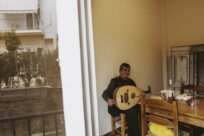
Finding a community with his music
3 Dec 2020‘I grew up in a large family,” Mahmoud says of his youth. Growing up on the West Bank, in the Occupied Palestinian Territories, Mahmoud, had to adapt to the world around him, a world he could not see. Without his eyesight, Mahmoud found he had an ear for the sounds […]
-
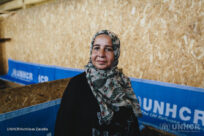
“We listen to women and become their voice”
25 Nov 2020Refugee women on Chios island help survivors of gender-based violence
-

“I feel like I have never been a child”
24 Nov 2020Determination and passion for human rights: 17-year-old Nesime from Afghanistan is determined to start a new life and help others
-
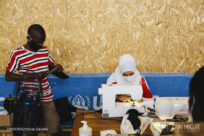
“I make face masks because I care”
20 Nov 2020Asylum-seekers in Chios take action against COVID-19
-
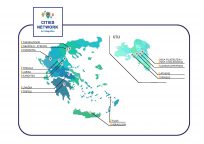
The Cities Network for Integration strengthens its operation – 1st Newsletter
2 Oct 2020The Cities Network for Integration (CNI) is presenting its first Newsletter. The CNI is an initiative led by Greek Municipalities that host refugee populations. Under the CNI, for the first time Greek municipalities – regardless of their size – come together to promote cooperation on integration issues and to have […]
-

Video: Five refugee girls and their parents start a new life in Heraklion
28 Sep 2020“I really like going to the playground, I love the swings. I have met many children from the neighborhood, and we have become friends”. Eight-year-old Alisar, speaks with enthusiasm about the new city she lives in with her parents and her four sisters. The family of eight arrived in Heraklion […]
-
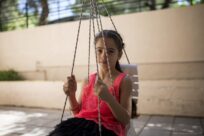
“Crete has embraced us” – Five refugee girls and their parents start a new life in Heraklion
25 Sep 2020“I really like going to the playground, I love the swings. I have met many children from the neighborhood and we have become friends”. Eight-year-old Alisar, speaks with enthusiasm about the new city she lives in with her parents and her four sisters. The family of eight arrived in Heraklion […]
-
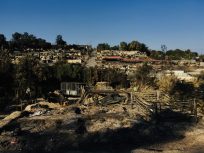
We can’t let the value of life be lost in the ashes
14 Sep 2020The tragic images of the last days coming from Lesvos have once more been on the news all over the world. The Reception and Identification Center in Moria has been almost totally destroyed and the whole population on the island, locals, refugees, migrants, are being tested once more. The 12,000 […]
-
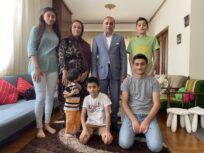
“Helping people makes our heart feel full’: A refugee family in Trikala makes protective masks and uniforms for the local community
27 Jul 2020It has been three months since Safar started making protection masks for COVID-19. So far, he has sewn more than a thousand masks, which have been distributed to refugees, but also to the residents of Trikala city in central Greece, where he lives with his family. The asylum-seeking family from […]
-
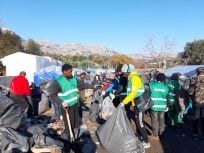
Volunteer refugees on Chios island make a difference for their communities
29 Jun 2020Fabrige from Congo pushes a cart filled with bags and empties them inside the garbage bins. Lana from Syria reminds a woman, victim of domestic violence, her rights and advises her to ask for help from competent actors. Amal from Somalia gives instructions to people waiting in line for the […]










